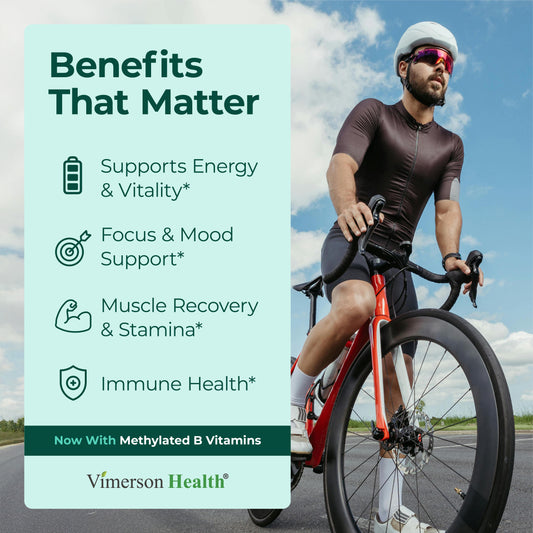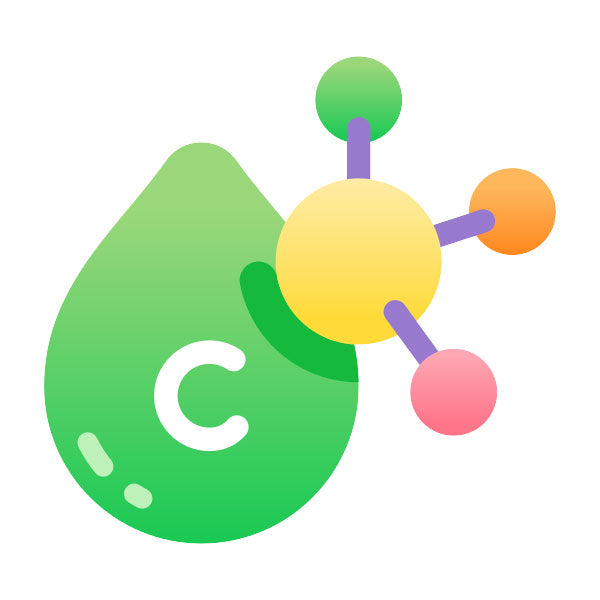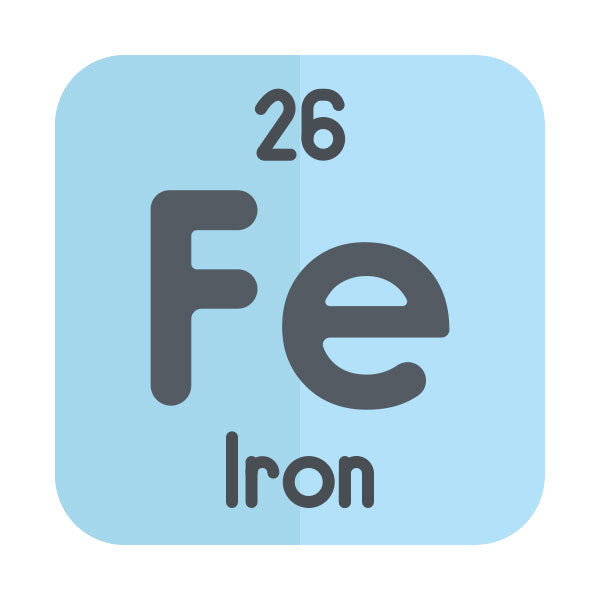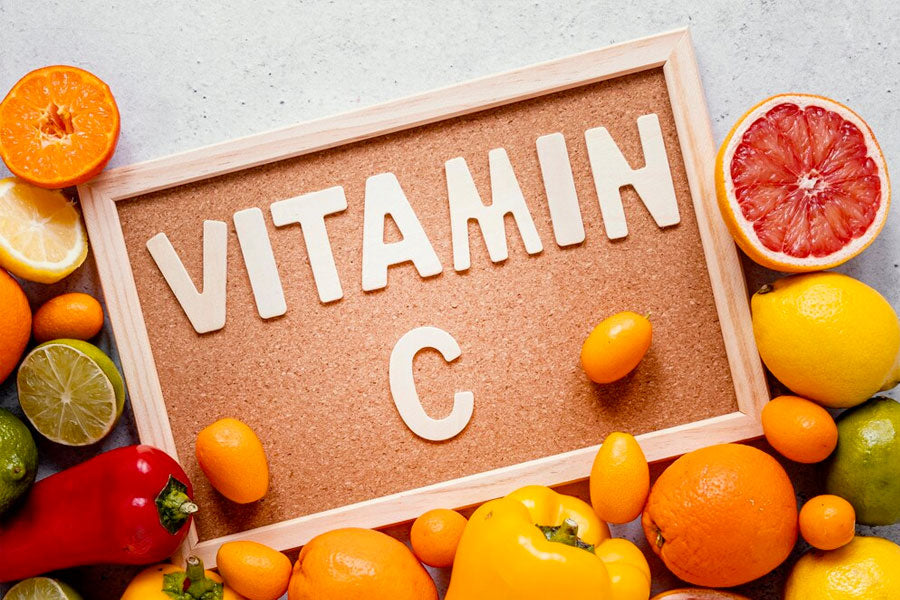WHAT IS VITAMIN C?
Vitamin C, also known as ascorbic acid, is a water-soluble vitamin, essential for the human body. Unlike many animals, humans cannot synthesize Vitamin C on their own and must obtain it from dietary sources.* It's known for its antioxidant properties, role in collagen synthesis, and contribution to immune defense.*

THE POWER OF VITAMIN C IN YOUR DAILY LIFE
In today’s health-conscious world, Vitamin C stands as a cornerstone of nutritional wellness.* Known for its immune-supporting properties, this essential nutrient plays a crucial role in various body functions, promoting overall health and vitality.*
UNDERSTANDING ASCORBIC ACID: THE CHEMICAL IDENTITY OF VITAMIN C
BEST SOURCE OF VITAMIN C
Vitamin C, known chemically as ascorbic acid, is abundantly available in a variety of fruits and vegetables, making it easy to incorporate into a diet rich in vitamin C. Citrus fruits like oranges (orange vitamin C) and lemons are well-known as the best source of vitamin C. However, other fruits and vegetables, such as strawberry vitamin C, blueberry vitamin C, pineapple vitamin C, and mango vitamin C, are also excellent sources. Vegetables like bell peppers, broccoli, and Brussels sprouts contain high levels of this nutrient, qualifying as foods high in vitamin C. Tomato vitamin C and banana vitamin C also contribute to a balanced vitamin C intake. For those who prefer supplements, ascorbic acid powder, liposomal vitamin C, and vitamin C tablets are effective options. The best vitamin C supplement is often one that aligns with individual health needs, such as vitamin C 1000mg or vitamin C 500mg tablets, depending on the daily recommended vitamin C intake.*
LIPOSOMAL VITAMIN C: ENHANCED ABSORPTION
THE VERSATILE ANTIOXIDANT: NEUTRALIZING HARMFUL FREE RADICALS
Oxidative stress can lead to cellular damage and is associated with a range of health challenges. Vitamin C, in its ascorbic acid form, stands as a potent antioxidant, counteracting the detrimental effects of harmful free radicals.* By neutralizing these free radicals, vitamin C plays a pivotal role in protecting cells and supporting overall health.*
THE WIDE-RANGING BENEFITS OF VITAMIN C
SYNERGY WITH OTHER NUTRIENTS: A COLLABORATIVE APPROACH
The synergy between vitamin C and other nutrients highlights the intricate interplay of our body's nutritional needs.* Vitamin C, or ascorbic acid, not only offers its own array of health benefits but also enhances the effectiveness of other vitamins and minerals.* It improves iron absorption, especially from plant-based sources, and works in conjunction with the Vitamin B complex to support metabolic functions.* In skin health, the combination of vitamin C and hyaluronic acid is potent, promoting collagen production and hydration.* Vitamin C also pairs effectively with vitamin D and zinc for immune support, particularly crucial during pregnancy and cold seasons.* Additionally, its role alongside other antioxidants like vitamin E underscores its importance in combating oxidative stress.* To harness these synergistic benefits, incorporating foods high in vitamin C or selecting the best vitamin C supplements, such as liposomal vitamin C or vitamin C capsules, is beneficial for holistic health and wellness.*
VITAMIN C IN SKINCARE: MORE THAN JUST A SERUM
VITAMIN C FOR DIFFERENT AGE GROUPS
The necessity of Vitamin C, or ascorbic acid, spans across all age groups, each requiring varying amounts based on their specific health needs.* For children, it's crucial for growth and immunity, with foods high in Vitamin C like orange vitamin C and blueberry vitamin C being ideal.* Adults benefit greatly from Vitamin C, particularly for skin health and immune support, making Vitamin C tablets and ascorbic acid powder popular choices.* Seniors, who might face challenges in nutrient absorption, often turn to the best vitamin C supplement for immune system support and overall health maintenance.* The daily recommended Vitamin C intake should be met through a diet rich in Vitamin C sources, such as fruits rich in Vitamin C and vegetables high in Vitamin C.* While it's rare, excess vitamin C side effects can occur, especially when high doses are consumed without medical supervision. Thus, it's crucial to understand the benefits of Vitamin C vitamins and the best source of Vitamin C for each age group, ensuring a balanced intake for optimal health.*
VITAMIN C SUPPLEMENTS: FORMS AND EFFICACY
EMBRACING THE POWER OF VITAMIN C
In summary, Vitamin C, or ascorbic acid vitamin C, is a powerhouse nutrient. Whether it’s through diet rich in vitamin C, natural vitamin C supplement, or best vitamin C tablets, incorporating this vital nutrient into your life can have transformative effects on your health and wellness.*
BEST LIPOSOMAL VITAMIN C SUPPLEMENT 🥇
Example product title
ℹ︎ FREQUENTLY ASKED QUESTIONS ABOUT VITAMIN C
WHAT IS THE VITAMIN C GOOD FOR?
Vitamin C is essential for various functions in the body. It plays a crucial role in the maintenance of a healthy immune system and is also important for the growth and repair of tissues.* Vitamin C aids in the production of collagen, essential for skin, tendons, ligaments, and blood vessels.* Additionally, it enhances iron absorption and contributes to wound healing and the maintenance of healthy bones and teeth.* As an antioxidant, it helps combat free radicals, potentially reducing oxidative stress.*
WHAT FOOD IS HIGHEST IN VITAMIN C?
Foods highest in Vitamin C include citrus fruits like oranges and grapefruits, which are well-known for their high content. Other excellent sources are red and green bell peppers, strawberries, kiwi fruit, guavas, and papayas. Vegetables such as broccoli, Brussels sprouts, and cauliflower are also rich in vitamin C. These foods not only offer vitamin C but also provide a range of other nutrients beneficial for overall health.*
IS VITAMIN C THE MOST IMPORTANT?
While Vitamin C is essential for various bodily functions, including immune support and skin health, it's not necessarily the most important vitamin.* Each vitamin plays a unique and crucial role. For example, Vitamin D is vital for bone health, and B vitamins are key for energy metabolism.* A balanced diet providing a range of vitamins is essential for overall health and well-being.*
CAN I TAKE VITAMIN C EVERYDAY?
Yes, you can take Vitamin C every day.* It's a water-soluble vitamin, meaning it's not stored in the body and needs to be replenished regularly. The recommended daily intake varies, but for adults, it's typically around 65 to 90 milligrams per day. Exceeding 2,000 milligrams daily can lead to side effects, so it's important to stay within recommended limits.* Vitamin C is crucial for immune function, skin health, and other bodily processes.*
WHAT DOES VITAMIN C DO TO YOUR FACE?
Vitamin C, when applied topically to your face, serves several beneficial functions.* It's a powerful antioxidant that helps protect skin from environmental stressors.* Additionally, it plays a vital role in collagen synthesis, aiding in skin elasticity and firmness.* Vitamin C can also help even out skin tone, reduce the appearance of fine lines, and enhance overall skin radiance.* It's a key ingredient in many skincare products for its restorative and protective properties.*
IS 1000 MG OF VITAMIN C TOO MUCH?
Taking 1000 mg of Vitamin C daily is generally safe for most adults.* The recommended daily allowance for Vitamin C is 500-1000 mg, with an upper limit of 2000 mg.* While 1000 mg is higher than the daily recommendation, it's still below the maximum limit. However, high doses can sometimes cause side effects like digestive discomfort. It's important to balance intake and consider individual health needs and tolerance.*
DOES VITAMIN C GIVE YOU ENERGY?
Vitamin C doesn't directly provide energy in the same way calories from carbohydrates, proteins, or fats do. However, it plays a crucial role in the body's energy production process.* Vitamin C is essential for the synthesis of L-carnitine, a molecule that helps in the oxidation of fatty acids to produce energy.* Therefore, while it may not give an immediate energy boost, adequate Vitamin C is vital for overall energy metabolism.*
DO I REALLY NEED TO USE VITAMIN C?
Vitamin C is essential for your health.* It plays a vital role in collagen synthesis, wound healing, and as an antioxidant, it helps protect cells from damage.* Vitamin C also supports the immune system and assists in the absorption of iron from plant-based foods.* As the body cannot produce or store it, regular intake through diet or supplements is necessary to maintain adequate levels.*
IS VITAMIN C GOOD FOR SKIN?
Yes, Vitamin C is excellent for skin health.* It's a potent antioxidant that helps protect the skin from free radical damage caused by UV exposure.* Vitamin C also plays a crucial role in collagen synthesis, which is vital for skin elasticity and firmness.* Topical application of Vitamin C, often in the form of serums, can help brighten the skin, reduce signs of aging, and improve overall skin texture.*
IS IT BETTER TO HAVE A HIGHER VITAMIN C?
Having a higher intake of Vitamin C can be beneficial, as it's essential for immune system function, skin health, and the absorption of iron from plant-based foods.* However, it's important to stay within recommended limits, as excessive intake can lead to side effects like gastrointestinal discomfort.* The body can't store Vitamin C, so regular intake through diet or supplements, within the recommended daily allowance, is advisable for optimal health.*
* These statements have not been evaluated by the Food and Drug Administration. This product is not intended to diagnose, treat, cure, or prevent any disease.































